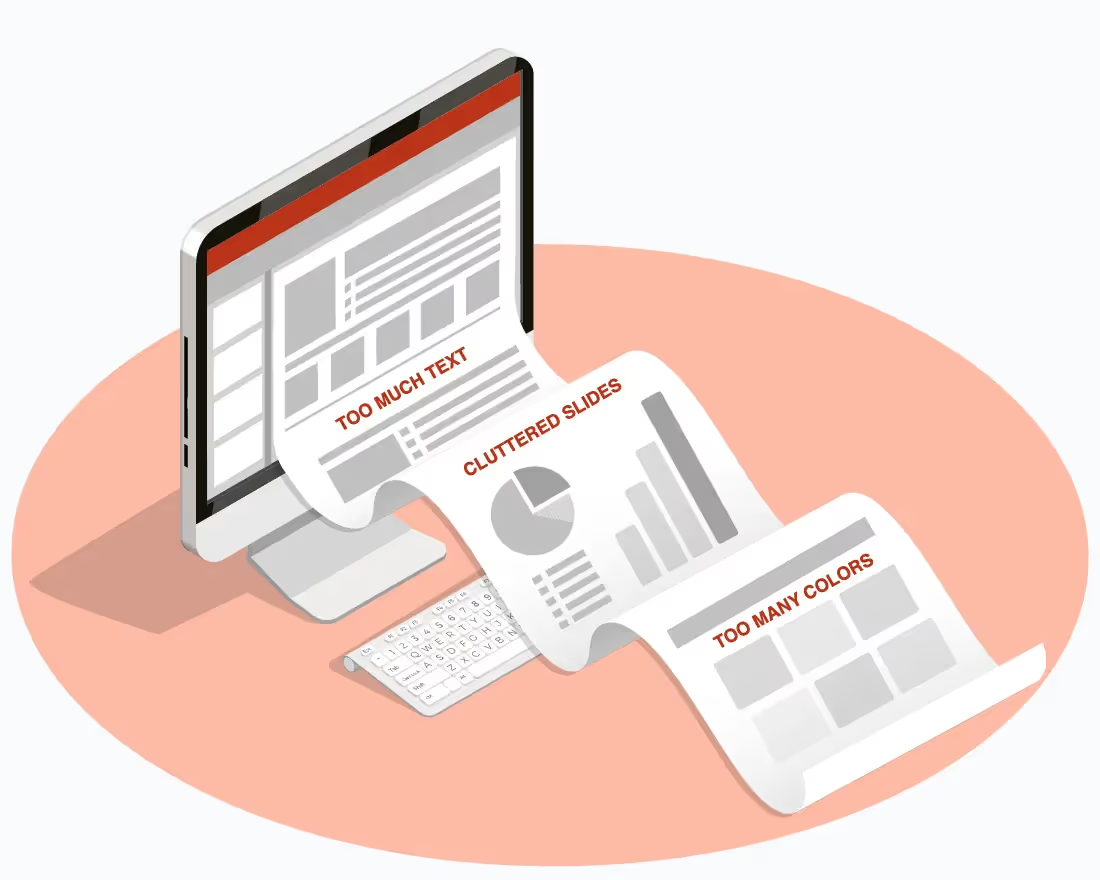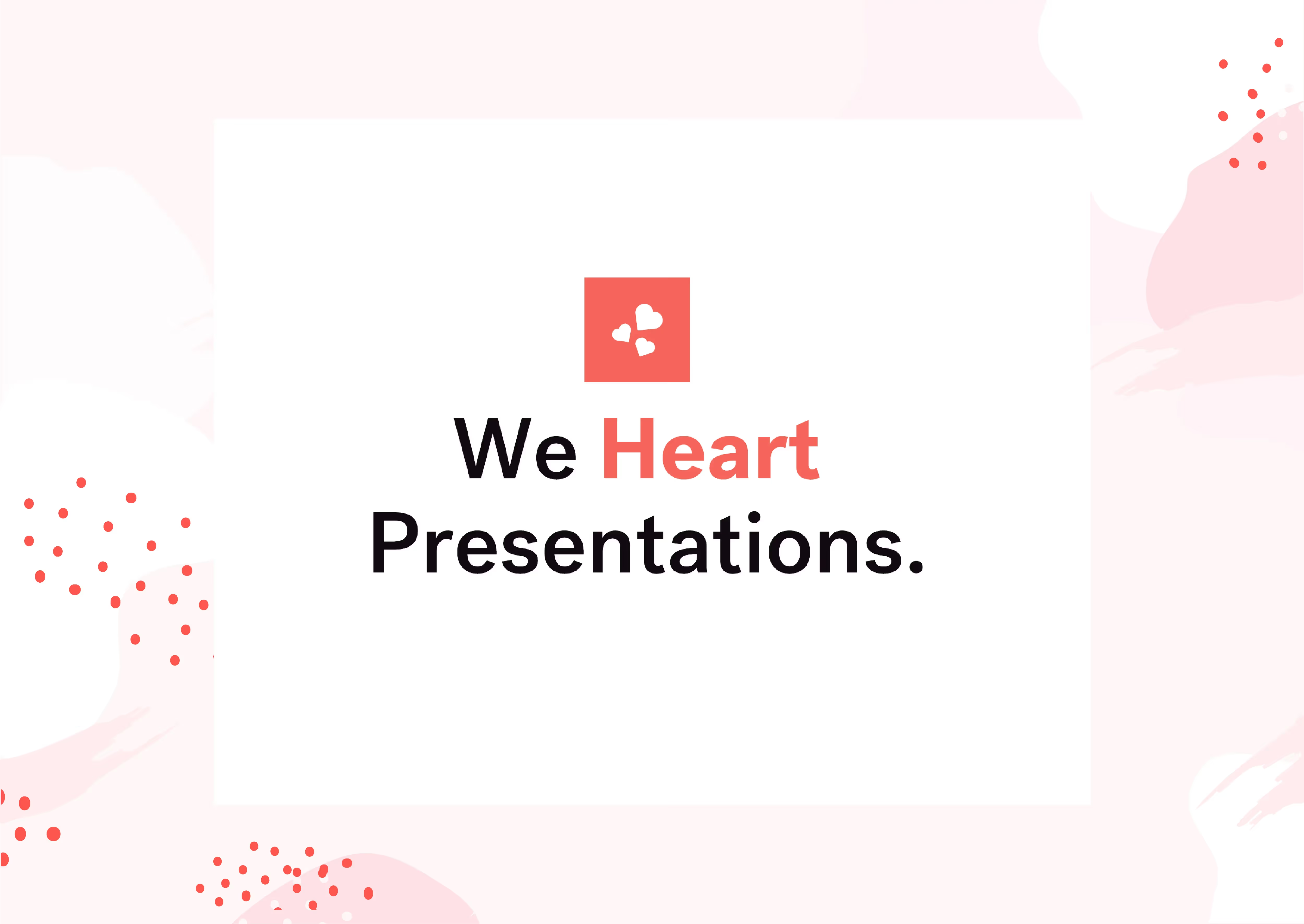
Trade shows and conferences can feel cluttered and disjointed, with an array of booths, companies, and marketers vying for attention.
Amidst this backdrop, presentations have the power to spotlight your brand, transforming each encounter into a memorable narrative for your potential clients.
Using presentations in your trade show or event marketing strategy allows you to communicate key messages and engage with your audience dynamically. Decks can help with the planning process and post-event wrap-up. Presentations can enhance your brand visibility and leave a lasting impression on potential clients, whether you are presenting to a crowd or following up with important information.
Benefits of event marketing and showcasing your product at trade shows
Part of a good event marketing strategy is having numerous events your company is throwing, sponsoring, or attending. Attending trade shows and industry conferences offers businesses a unique opportunity to increase visibility, engage with potential clients, and compellingly showcase their products.
Some of those benefits include:
1. Enhanced brand visibility
Trade shows gather a concentrated audience of industry professionals, media, and potential clients. By participating, your brand gets direct exposure to a targeted and captive audience. A visually appealing booth, paired with engaging content, can help your brand stand out amidst the competition.
2. Direct engagement with prospects
Face-to-face interaction is invaluable in building relationships. Trade shows provide a platform to directly engage with prospects, answer their questions in real time, and gauge their reactions. This personal touch can help establish trust and credibility, which is harder to achieve through other marketing channels.
3. Competitive analysis
Trade shows offer a comprehensive view of the competitive landscape. Observing other companies' booths, marketing materials, and presentations can give you insights into industry trends, competitor strategies, and market demands, which can be crucial for adjusting your marketing strategy.
4. Product showcase
There’s no better place to demonstrate your product’s capabilities than a trade show. Attendees can see, touch, and experience your product firsthand. Live demonstrations and presentations can effectively highlight your product’s unique features and benefits, making a lasting impression on potential clients.
5. Lead generation
A well-executed trade show strategy can result in many qualified leads. Engage attendees with compelling presentations, interactive exhibits, and product samples to capture their interest. Collect contact information and follow up promptly to convert these leads into customers.
6. Networking opportunities
Trade shows are not just about showcasing products but also about building connections. Networking with industry peers, potential partners, and influencers can open doors to new collaborations and business opportunities. These connections can be valuable for future growth and development.
7. Industry positioning
Participating in high-profile events can position your company as an industry leader. Being associated with reputable trade shows enhances your brand’s reputation and credibility. This positioning can give your business a competitive edge and attract more attention from potential clients and partners.
8. Immediate feedback
Trade shows offer an excellent opportunity to receive immediate feedback on your products or services. Engage with attendees to gather their opinions, suggestions, and concerns. This real-time feedback can be instrumental in refining your offerings and enhancing customer satisfaction.
9. Media exposure
Many trade shows attract media coverage, providing an additional avenue for gaining exposure. A strong presence at the event increases the likelihood of media mentions and interviews, amplifying your brand’s reach and influence.
10. Educational opportunities
Lastly, trade shows often feature seminars, workshops, and panel discussions. These sessions provide valuable insights into industry trends, innovations, and best practices. Attending these events can enhance your knowledge and give you a competitive advantage in your market.
How to create an engaging presentation for an industry conference
Giving an effective presentation to an audience of people requires more than just stage presence and well designed slides. You need to know who your audience is and how to leverage their attention best and leave them with the message you want to give them.
Start with the type of presentation you want to give. Every conference is different and may have formats they are used to using, like panel or keynote presentations. Before starting on your presentation, check out any guidance they have that might be specific to that event.
When crafting your presentation, it’s crucial to weave your company story into the narrative. People connect with stories more than they do with raw data or sales pitches, so you must ensure that your story is aligned with the overarching message of your presentation.
Showcase customer testimonials
Another must-have in any trade show or conference presentation is anecdotes and testimonials from clients to add authenticity. Give the audience a break from your perspective. Adding customer quotes always moves the needle because it shows what you’re doing is working.
Utilize Smart Slide Templates
These templates are designed to be aesthetically pleasing and functional, allowing you to organize your content effectively. They help maintain consistency in design, which is crucial for branding, especially when your audience is still getting to know you.
Leverage powerful graphics
Visuals like charts, graphs, and infographics can help explain complex information more clearly and quickly than text alone. They can also make your content more engaging and easier to remember. Opt for clean, simple graphics that complement your narrative.
Maximize post-event impact with personalized follow-ups
Precision in your follow-up strategy can differentiate between a lost opportunity and a new client. Start by segmenting your leads based on their level of interest and engagement during the event. This allows you to tailor your follow-up messages more effectively.
Use personalized emails to thank attendees for visiting your booth and include a recap of your presentation. Attach a copy of the presentation or provide a link to an online version for easy reference. Additionally, offer further resources or set up a meeting to discuss potential collaborations or solutions in more detail.
Timeliness is key; aim to follow up within a few days of the event. A prompt, targeted follow-up shows that you value the attendees' time and are eager to continue the conversation. This approach helps in converting leads into long-term business relationships.
Analyze & adapt your event marketing strategy for the next conference or trade show
After the trade show, take time to analyze the effectiveness of your presentation and overall event strategy. Gather feedback from attendees, team members, and other stakeholders to gain insights into what worked well and what could be improved. Look at metrics such as the number of leads generated, engagement levels during your presentation, and the quality of follow-up interactions.

Use this data to identify strengths and weaknesses in your approach. Did your visuals captivate the audience? Was your company story compelling? Were your follow-up efforts effective? Analyzing these elements will help you refine your strategy for future events.
Adapt your plans based on these insights. Perhaps you need to tweak your narrative, invest in better graphics, or enhance your follow-up process. Continuous improvement is key to staying competitive and making a lasting impact at future trade shows. By learning from each event, you can optimize your presentations and maximize your return on investment.

.avif)
.avif)




.gif)
